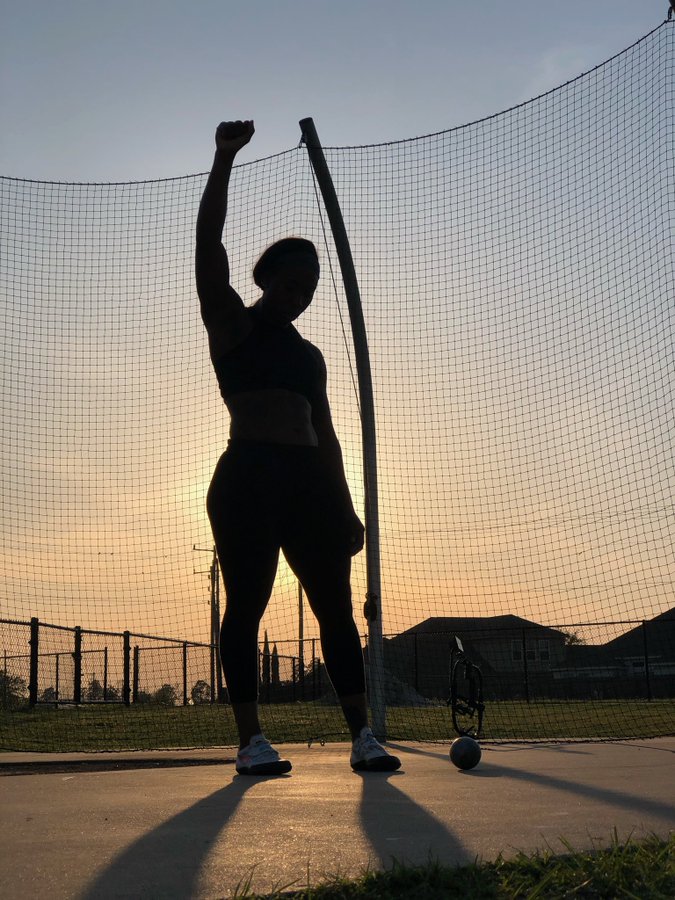American Olympians, along with a council representing all Team USA athletes, criticized the International Olympic Committee on Thursday for its reiteration of a ban on protests at the Games.
The United States Olympic and Paralympic Committee's Athletes' Advisory Council said in a statement that it was "disappointed that the work of the IOC Athletes' Commission" – which led a formal review of the controversial anti-protest rule – "did not result in a meaningful or impactful change."
Gwen Berry, a 2016 Olympian and 2020 hopeful in the hammer throw, was less diplomatic in a phone interview with Yahoo Sports. She called the IOC's 10-month review "gaslighting and tokenism at best," "insufficient" and "ridiculous." She and other North American athletes and athlete advocates felt all along that the process was empty and for-show.
"They weren't gonna change the rule," Berry said.
On Twitter, she called the IOC "full of s***," and "hypocrites who continue to silence athletes for capital gain."
The IOC has said it will clarify what punishments athletes could face if they do protest.
Berry, who in 2019 protested systemic racism by raising her fist on a Pan American Games podium, said the restrictions wouldn't prevent her and others from demonstrating at the Tokyo Olympics.
"This doesn't deter me, or athletes like me, who want to talk about issues that need to be recognized," Berry said. "We'll speak out. We'll say what needs to be said. And we'll do what needs to be done.
"And we do have support from legal teams and maybe the USOPC."
Differing responses to IOC survey
The USOPC in December called on the IOC to end its prohibition of peaceful protest, and said that it wouldn't punish its own athletes for such protests.
But the IOC unanimously approved a mostly-unchanged policy on Wednesday. Its review was in part based on a survey of 3,547 athletes from around the world. The survey found that strong majorities of athletes believed it was inappropriate to "demonstrate or express their individual views on political issues and other topics" during ceremonies, including medal ceremonies, and on the field of play.
An athlete-led Team USA council, comprising active Olympians, alumni, administrators and industry experts, had urged the IOC to "clearly distinguish between human rights/social justice protests and instances of hate speech, racist propaganda, and discriminatory remarks aimed at eliminating the rights and dignity of historically marginalized and minoritized populations."
But the key portion of the IOC survey simply asked athletes about the appropriateness of Olympians "demonstrat[ing] or express[ing] their individual views on political issues and other topics."
USOPC CEO Sarah Hirshland previously acknowledged the difficulty of formulating universal protest rules while accommodating such a wide range of worldviews. Survey results showed significant differences of opinion between, for example, Chinese athletes and American ones. In a Thursday statement, Hirshland thanked the IOC for its review, but stood by the USOPC's "policy in support of peaceful and respectful demonstration."
Berry, though, criticized the IOC's reliance on a quantitative survey in its review. "They asked privileged athletes, when it's the underprivileged that need their voices to be heard, it's the minorities that need their voices to be heard," Berry said. The survey, she contends, gave equal weight to the voices of athletes to whom this topic is relatively unimportant and athletes to whom it matters deeply.
The USOPC AAC said in its statement: "Until the IOC changes its approach of feeding the myth of the neutrality of sport or protecting the status quo, the voices of marginalized athletes will continue to be silenced.
"We believe that athletes are humans first and athletes second, and we stand firm in our commitment to empower, support, and protect members of Team USA who use their platform to fight for racial and social justice."
Multiple advocates for athletes' rights, including two independent international organizations and a group representing German athletes, have pledged to support and protect athletes who protest despite the IOC's rule.
The USOPC has said it will wait for more specifics from the IOC before providing guidance to athletes on potential punishment. "We look forward to collaborating with the IOC to provide clarity on sanctions and education," Hirshland said in a statement.
Berry said she looked forward to that clarity.
Even without it, she said: "When I make the team, I'll go full force, and represent. I won't be silent."

